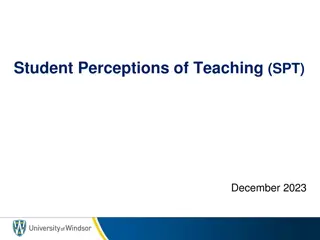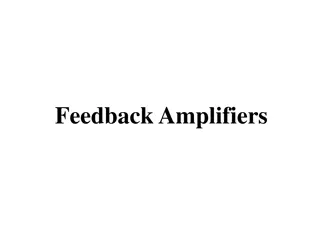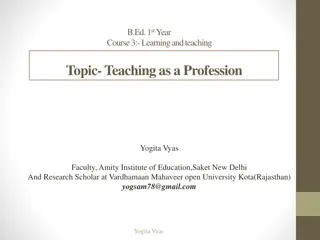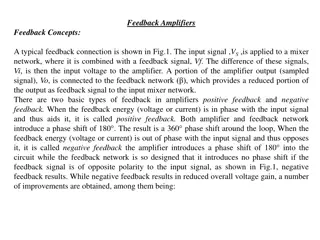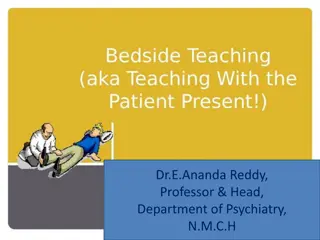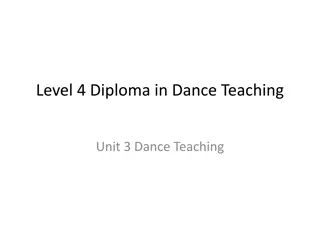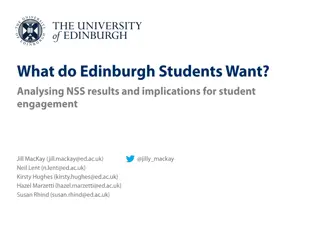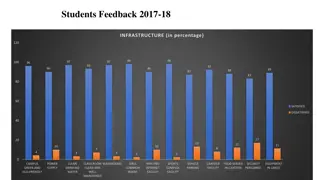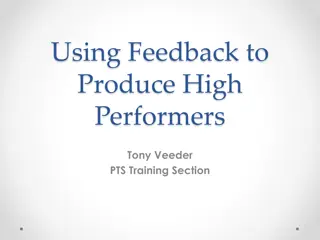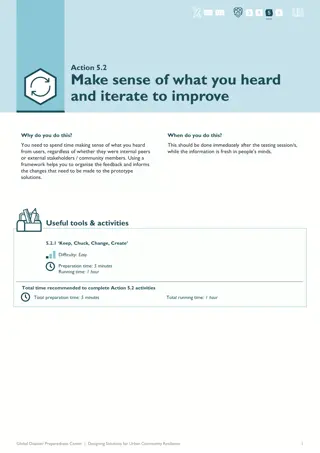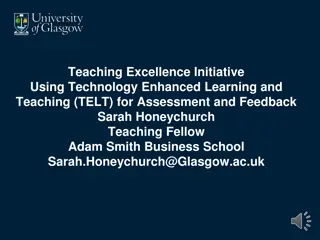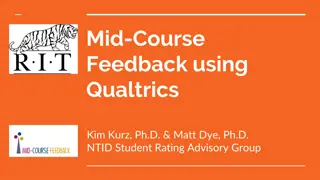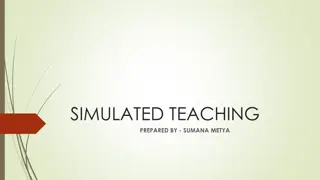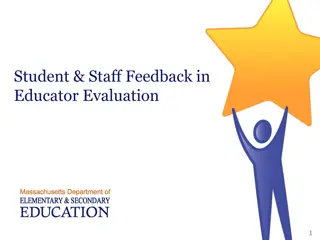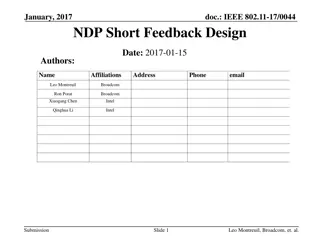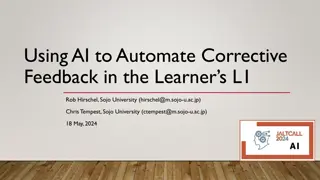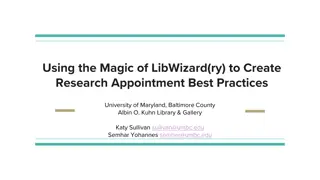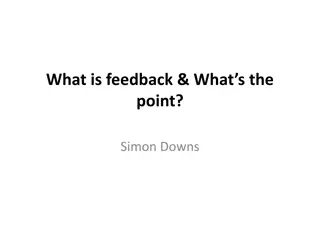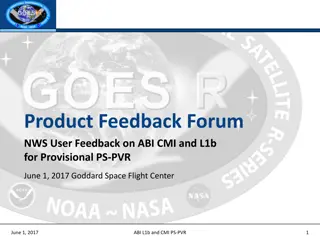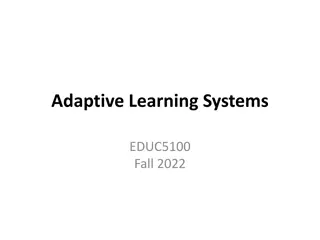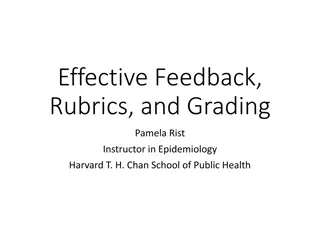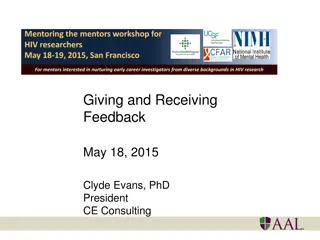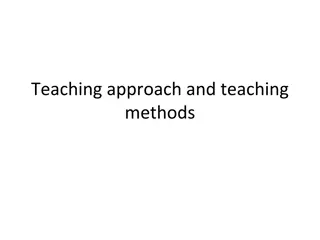Transition from SIRS to SPLS: Enhancing Teaching Quality at MSU
The transition from SIRS to SPLS at MSU aims to bring a research-informed approach to gathering and utilizing student feedback, leading to an improvement in teaching quality. This shift involves a cultural change to address biases in evaluating teaching practices. The SPLS system focuses on collecti
1 views • 28 slides
Enhancing Student Learning Through Effective Feedback Strategies
Effective feedback plays a crucial role in improving student learning outcomes by providing specific information that students can use to enhance their performance. This content explores the importance of feedback, examples of good feedback practices, qualities of good feedback, and what components
5 views • 16 slides
Teaching Observation Process and Best Practices
Explore the teaching observation process with a focus on fostering faculty success and improving teaching practices. Learn about pre-observation meetings, separating observation from evaluation, and utilizing observations to spark dialogue about effective teaching. Access resources such as the Teach
7 views • 20 slides
Student Perceptions of Teaching (SPT) Survey Process
Providing feedback on teaching and course design through the Student Perceptions of Teaching (SPT) survey. Surveys are submitted online, with confidentiality ensured. The process includes grading instructor delivery, expectations, and feedback, focusing on various aspects of the learning environment
5 views • 10 slides
Effective Feedback Strategies for Learning Enhancement
Feedback plays a crucial role in the learning process. This session focuses on strategies for providing effective feedback to improve learning outcomes, course, and assignment design, best practices, and tools for efficient feedback delivery. Understanding the importance of prompt feedback and diffe
3 views • 20 slides
Understanding Feedback Amplifiers: Structure, Properties, and Topologies
Electronic circuits rely heavily on feedback mechanisms, particularly negative feedback, for various purposes such as desensitizing gain, reducing distortion, controlling impedance, and improving amplifier bandwidth. This article explores the general structure of feedback, properties of negative fee
0 views • 68 slides
Co-Teaching in Student Teaching: A Collaborative Approach
Co-teaching in student teaching involves mentor teachers and student teachers working together to plan, deliver, and assess instruction while sharing responsibilities and opportunities for collaborative pedagogy. It is a model that enhances student learning by engaging two teachers actively in the c
0 views • 21 slides
Enhancing Feedback Practices with Audio-Visual Technology: A Study on Student Satisfaction and Attainment
This presentation delves into the implementation of Audio-Visual Feedback (AVF) technology to improve assessment feedback practices in an educational institution. The study explores the impact of AVF on student satisfaction levels compared to traditional written feedback, as well as its influence on
0 views • 21 slides
Understanding Teaching as a Profession by Yogita Vyas
Explore the comprehensive module by Yogita Vyas focusing on the nature of teaching, characteristics of effective teaching, importance of teaching as a profession, and qualities of a professional teacher. Gain insights into the teaching profession, its role in society, and the essential skills requir
1 views • 27 slides
Understanding the Importance of Feedback in Achievement Enhancement
Feedback plays a crucial role in encouraging or discouraging behavior, making it essential to provide constructive feedback that focuses on growth and improvement. Improper feedback can lead to incompetence in the workplace. Learn about the definition of feedback, how to give feedback effectively, a
2 views • 22 slides
Understanding Feedback Amplifiers in Electronic Circuits
Feedback amplifiers play a crucial role in electronic circuits by providing mechanisms for controlling gain, stability, and overall performance. There are two basic types of feedback - positive and negative, each offering distinct advantages. The four ways of connecting feedback signals involve volt
1 views • 18 slides
Principles and Strategies for Effective Bedside Teaching in Clinical Settings
Explore the key concepts of bedside teaching in clinical rounds, focusing on patient-centered education, principles of adult learning, and strategies for effective teaching. Learn about the importance of clear objectives, active involvement, and feedback in the teaching process. Discover where bedsi
1 views • 33 slides
University Partnership Forum 2018: Survey Results & Feedback Analysis
The UK's European University Partnership Forum 2018 presents survey findings from the Partner Institution Survey 2016/17 conducted by Matthew Redmond. The survey aims to gather direct feedback from partner students on teaching, assessment, support, resources, and personal development. It highlights
0 views • 18 slides
Enhancing Feedback Strategies in ELA Learning Project Day
Refine understanding of ELA, engage with student exemplars, and design constructive feedback in a structured agenda. Activities include generating feedback, digging deeper into feedback processes, and considering the impact of timely and specific feedback on student growth in learning and skills. Co
0 views • 31 slides
Level 4 Diploma in Dance Teaching Unit 3 Overview
In Level 4 Diploma in Dance Teaching Unit 3, the focus is on dance teaching practice. The learner is observed teaching a class, supported by written evidence such as teaching logs and lesson planning. Continuous Professional Development activities are also emphasized. The examination involves teachi
0 views • 8 slides
University Student Feedback on Teaching and Support Services
Students express mixed feelings about the teaching quality and support services at the university. While some praise the helpfulness of staff and the university's reputation, others feel neglected and marginalized, especially in comparison to postgraduate research students. Feedback varies on teachi
0 views • 12 slides
Effective Feedback Strategies for Resident Teachers
Effective feedback is critical for the growth of resident teachers. This guide covers types of feedback, why it's important, what makes feedback effective, behaviorally anchored rating scales, models for giving feedback, and key tips for delivering feedback successfully.
0 views • 14 slides
Students Feedback on Infrastructure, Learning & Teaching, Administration, Library 2017-18
The students provided feedback on various aspects such as infrastructure, learning and teaching, administration, redressal and grievance cell, and the library for the academic year 2017-18. The feedback covers satisfaction levels in terms of facilities, services, faculty, administration, and library
1 views • 4 slides
Effective Feedback Strategies for High Performance
Feedback plays a crucial role in helping individuals improve performance and reach their full potential. From providing helpful feedback to reinforcing desired behaviors, this guide explores various strategies, including redirection, reinforcement, and F.A.S.T. feedback, to enhance workplace perform
0 views • 21 slides
Enhancing Postgraduate Academic Writing: Feedback Collaboration Model
Developing a collaborative model for postgraduate academic writing courses involves understanding the role of feedback, focusing on content feedback, and exploring the intersections between discipline specialist and writing tutor feedback to improve academic writing abilities. Feedback offers valuab
1 views • 27 slides
Teaching Staff Digital Experience Insights Survey Results 2020-21
This presentation provides insights from the Teaching Staff Digital Experience Insights Survey for the year 2020-21. It focuses on key metrics related to technology at the organization, technology in teaching, and the development of digital skills among teaching staff. The survey collected feedback
2 views • 26 slides
Iterative Feedback Framework for Prototype Improvement
The iterative feedback framework involves making sense of user feedback using the Keep, Chuck, Change, Create (KCCC) model to iterate and enhance prototype solutions. This process helps organize input from testing sessions, informing necessary modifications for better outcomes. The framework emphasi
1 views • 26 slides
Using Technology for Assessment and Feedback in Teaching Excellence Initiative
Self-regulated learners in higher education benefit from active involvement in assessment and feedback processes, leading to deeper learning. Good assessment and feedback practices promote self-regulation by engaging students in setting goals, making evaluative decisions, generating feedback, and re
0 views • 6 slides
Understanding Mid-Course Feedback Using Qualtrics
Mid-Course Feedback (MCF) is a valuable process that allows students to provide feedback on their courses mid-semester, impacting teaching strategies, communication, materials, and more. This feedback benefits both students and instructors by improving teaching effectiveness, student satisfaction, a
0 views • 21 slides
Understanding Simulated Teaching for Effective Classroom Training
Simulated teaching is a powerful training technique that uses role-playing to change student behavior. It helps student teachers practice teaching skills in artificial scenarios before real classroom situations. This method allows for effective feedback, easy implementation, and the opportunity to r
0 views • 11 slides
Importance of Student and Staff Feedback in Educator Evaluation
Student and staff feedback plays a crucial role in educator evaluation, providing valuable insights into areas of strength and growth. Informed by evidence such as surveys, observations, and artifacts, feedback helps educators tailor their practice, fostering two-way communication and professional d
0 views • 14 slides
Understanding Cascade Control Systems in Industrial Processes
Cascade control systems play a crucial role in improving process control efficiency by incorporating feedback loops within feedback loops. This type of control architecture helps to better handle disturbances and variations in the process by creating secondary loops that monitor specific parameters.
0 views • 8 slides
IEEE 802.11-17/0044 NDP Short Feedback Design
The document discusses the need for short simultaneous feedback from multiple STAs in IEEE 802.11 systems for improved efficiency. It introduces the NDP feedback mechanism and proposes a signaling technique to efficiently collect feedback from a high number of STAs. The mechanism involves UL MU tran
0 views • 19 slides
USC Teaching Excellence Initiative Progress Report
The USC Teaching Excellence Initiative highlights progress in developing a School Teaching Plan with five key elements, focusing on faculty-led processes, defining teaching excellence, supporting faculty development, evaluating teaching excellence, and rewarding outstanding performance. The Center f
0 views • 6 slides
AI Automation for Corrective Feedback in Language Learning
Exploring the utilization of AI technology to automate and enhance corrective feedback in language learning, addressing challenges such as time constraints, delayed feedback, and student comprehension. Introduction of a new AI text tool by Marcus Green for accessible and effective feedback provision
0 views • 13 slides
Enhancing Research Appointment Services at UMBC Library
UMBC subject librarians implemented a feedback survey to improve research appointment services. By analyzing feedback data, shared best practices were developed to ensure quality and consistency. The project timeline included identifying goals, drafting the timeline, creating the feedback form, and
0 views • 7 slides
Understanding the Importance of Feedback in Learning and Development
Feedback plays a crucial role in providing information about performance or behavior to affirm strengths and improve weaknesses. It helps individuals become consciously competent by identifying areas for improvement through formative assessment. Effective feedback enhances motivation, promotes learn
0 views • 33 slides
IEEE 802.11-19/0709r0 - Immediate and Delayed Feedback May 2019
The document discusses immediate and delayed feedback mechanisms in IEEE 802.11-19/0709r0, focusing on parameters, feedback types, and ranging options. It explores variations in feedback direction and types, proposing options for phase shift feedback and distinguishing between RSTA-to-ISTA and ISTA-
0 views • 6 slides
Product Feedback Forum at NWS: Provisional PS-PVR User Feedback on ABI, CMI, and L1b
A comprehensive feedback system managed by PRO at NWS, focusing on user input for GOES-R products such as ABI, CMI, and L1b. The forum gathers feedback through surveys and weekly calls, addressing product quality issues and ensuring effective communication with field sites. Noteworthy discussions in
0 views • 18 slides
Understanding Feedback in Learning Systems
Exploring the role of feedback in educational settings, this content delves into the concept of providing information to learners by various agents. It discusses the importance of feedback in guiding learning progress, highlighting examples of correctness feedback and correct answer feedback. The be
0 views • 66 slides
Effective Feedback Strategies for Grading in Epidemiology Courses
In teaching epidemiology courses, maintaining consistency in grading among multiple TAs is crucial. Providing high-quality feedback is essential as it builds the foundation for future learning. This article emphasizes the importance of effective feedback, tips for giving feedback, creating grading k
0 views • 12 slides
Enhancing Your Teaching Portfolio with Effective Strategies
Empower your teaching portfolio by organizing, synthesizing, and reflecting on essential elements like syllabi, exams, and teaching philosophy. Write a captivating introduction, update your curriculum vitae, and craft a personal statement to highlight your qualifications and career goals. Share your
0 views • 10 slides
Exploring the Role and Objectives of Laboratory Teaching
The content delves into the various perspectives on laboratory teaching, its aims, pedagogical levels, and common challenges faced. It discusses specific aims of laboratory teaching, including familiarization with equipment, teaching experimental work attitudes, and training in observation and deduc
0 views • 32 slides
Feedback and Mentoring Workshop for HIV Researchers
Mentoring workshop for HIV researchers focusing on giving and receiving feedback, nurturing early career investigators, and working with faculty continuum. The workshop offers insights on feedback exercises, assumptions, and rhetorical questions about feedback. Participants are encouraged to reflect
0 views • 33 slides
Effective Teaching Approaches and Methods for Educators
Characteristics of good teaching include being sensitive to students' abilities and needs, using effective teaching methods, and integrating interactive teaching approaches. Teachers should structure their teaching in relation to students, be familiar with the curriculum, and develop methods that en
0 views • 40 slides



